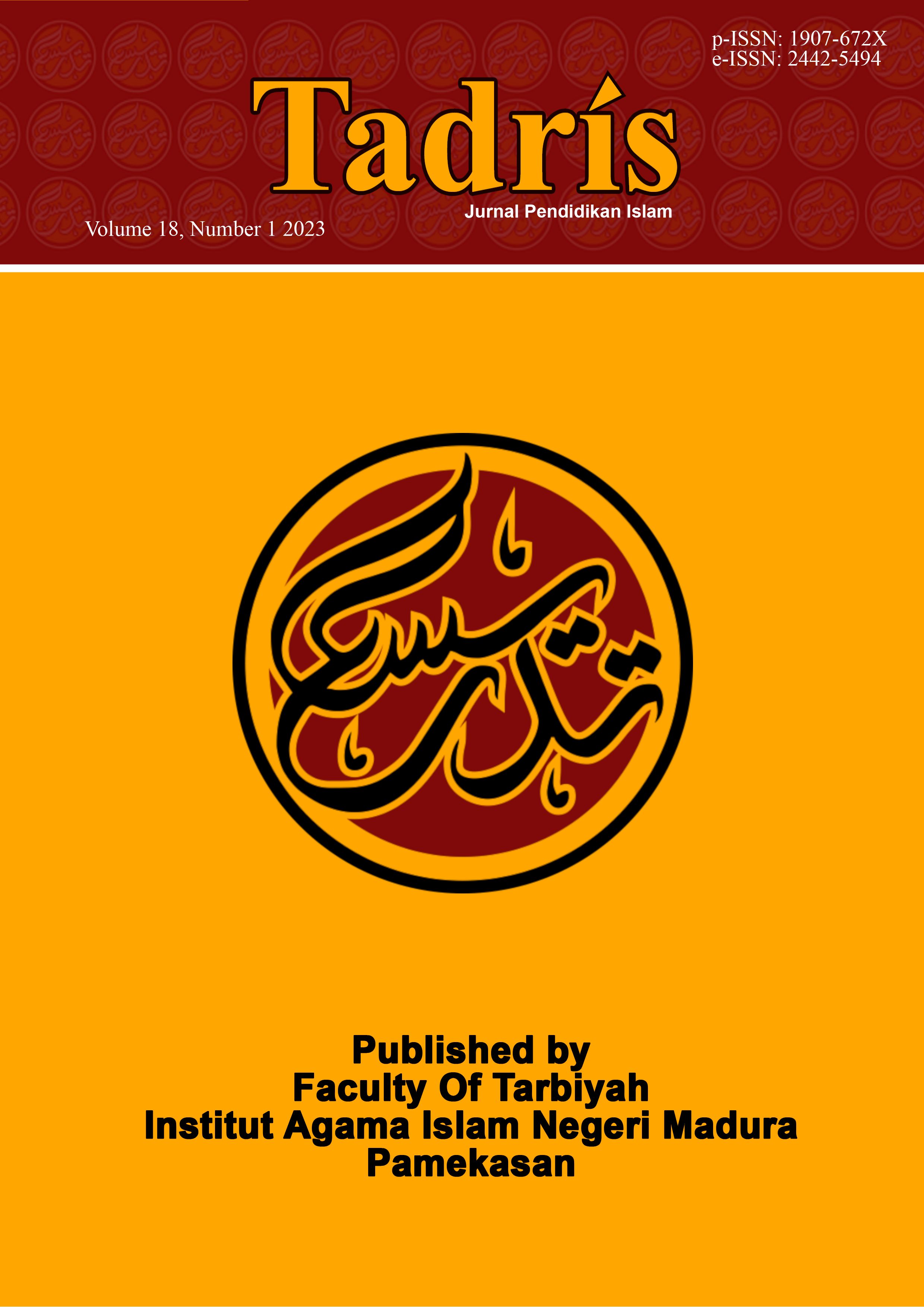The Concept of Cosmopolitan-Based Islamic Education in Madura
 Abstract views: 240
,
Abstract views: 240
,
 PDF downloads: 185
PDF downloads: 185
Abstract
This study focuses on the concept of Islamic education in Madura based on cosmopolitanism. This study has three research focuses to be studied: the concept of Islamic education, Madurese Islam and cosmopolitanism, and cosmopolitanism-based Madurese Islamic education. By using literature research by using a descriptive approach, this study reveals that Madura is a region known known as religious and multicultural place. Madurese Islamic education is defined as learning and knowledge based on Madurese Islam. The acculturation of culture and religion merges into a unique type of Madurese Islam with a variety of Madurese traditions and Islamic values. The meaning of rationality that is shared between the concepts of Islamic Education and cosmopolitanism is humanity without foundation. Based on the theory of cosmopolitanism, the concept of Islamic education in Madura is to prioritize Islamic religious teachings that are rahmatan lil'alamin, so to create togetherness among people regardless of the background for each individuals. The concept of Madurese Islamic education based on cosmopolitanism makes a person have a high concern for humanity, regardless of his background. Cosmopolitanism is interesting to study, especially in the area of Madura.
Downloads
References
Abd. Hakim Abidin. “Menyegarkan Kembali Gagasan Islam Kosmopolitan: Sebuah Ikhtiar Menegaskan Universalisme Islam | NU Online.” Last modified January 15, 2021. Accessed October 28, 2022. https://banten.nu.or.id/opini/ menyegarkan-kembali-gagasan-islam-kosmopolitan-sebuah-ikhtiar-menegaskan-universalisme-islam-PO1Ow.
Abudin Nata. Ilmu Pendidikan Islam. Jakarta: Prenada Media, 2016.
Ahmad Salehudin. Abdurrahman Wahid. Edited by Latief S. Nugraha. Yogyakarta: BasaBasi, 2019.
Ali, Ibnu, and A M Tohir. “Analisis Fungsionalisme Struktural Untuk Melihat Optimalitas Pelaksanaan Gerbang Salam Di Pamekasan.” NUANSA: Jurnal Penelitian Ilmu Sosial dan Keagamaan Islam (2018).
Amrullah, Afif. “Islam Di Madura.” Islamuna: Jurnal Studi Islam 2 (2015): 56.
anthony Appiah, Kwame. “Cosmopolitan Patriots.” Critical Inquiry 23 (1997): 617–639.
Dr. Mohammad Hefni, M A. ISLAM MADURA Sebuah Studi Konstruktivisme-Strukturalis Tentang Relasi Islam Pesantren Dan Islam Kampung Di Sumenep Madura. Literasi Nusantara, 2021. https://books.google.co.id/ books?id=0E9WEAAAQBAJ.
Fernée, Tadd. “Islam and Cosmopolitanism.” Sabah Ulkesi (January 1, 2015). Accessed October 27, 2022. https://www.academia.edu/20193787/ Islam_and_Cosmopolitanism.
Frazer, James George. The Golden Bough : A Study in Religion and Magic. London: Dover Publications, 2002.
Gizatova, Gulnaz, Olga Ivanova, and Kirill Gedz. “Cosmopolitanism as a Concept and a Social Phenomenon.” Journal of History Culture and Art Research 6 (2017): 25.
Habibullah, M. “Kosmopolitanisme Dalam Budaya Islam.” e-journal UIN Raden Fatah (2020): 274–282.
Hariyanto, Erie. “GERBANG SALAM: Telaah Atas Pelaksanaanya Di Kabupaten Pamekasan.” STAIN PAMEKASAN Vol 15, No (2012).
Haryanto, Joko. “Relasi Agama Dan Budaya Dalam Hubungan Intern Umat Islam.” SMART 1 (2015).
Herlinda, Eka. “Model Komunikasi Forum Kerukunan Umat Beragama (FKUB) Dalam Menjaga Kerukunan Antar Umat Beragama Di Pamekasan.” IAIN Madura, 2020.
Jamaluddin, Muhammad Nur. “Wujud Islam Rahmatan Lil Âlamin Dalam Kehidupan Berbangsa Di Indonesia.” ADLIYA: Jurnal Hukum dan Kemanusiaan 14, no. 2 (2021): 271–394.
Jozef Raco. Metode Penelitian Kualitatif. Jakarta: Grasindo, 2010.
Khairudin Aljunied. Muslim Cosmopolitanism. International Journal of Asian Studies. Edinburgh: Edinburgh University Press, 2017.
Kuntowijoyo. Muslim Tanpa Masjid. Edited by Idi Subandy Ibrahim. Yogyakarta: IRCiSoD, 2018.
Luthfi, Khabibi Muhammad. “Islam Nusantara: Relasi Islam Dan Budaya Lokal.” SHAHIH: Journal of Islamicate Multidisciplinary 1, no. 1 (June 28, 2016): 1–12. Accessed October 24, 2022.
https://www.researchgate.net/publication/312264515_Islam_Nusantara_Relasi_Islam_dan_Budaya_Lokal.
Mestika Zed. Metode Penelitian Kepustakaan. 5th ed. Jakarta: Yayasan Pustaka Obor Indonesia, 2018.
Muqoyyidin, Andik Wahyun. “Dialektika Islam Dan Budaya Lokal Jawa.” IBDA` : Jurnal Kajian Islam dan Budaya 11, no. 1 (1970): 1–18.
Muslim, Abu. Nurcholis Madjid Dan Politik Muslim : Antara Interpretasi Islam, Kontestasi, Dan Otoritas. Yogyakarta: IRCISOD, 2021.
Nor Hasan, Edi Susanto. Relasi Agama Dan Tradisi Lokal (Studi Fenomenologis Tradisi Dhammong Di Madura). Surabaya: CV. Jakad Media Publishing, 2021.
Pogge, Thomas. “Cosmopolitanism: A Path To Peace and Justice.” Journal of East-West Thought 2, no. 4 (2012): 9–32.
Rahman, Abdur, and Septina Alrianingrum. “Bentuk Kerukunan Antara Umat Beragama Di Vihara Avalokitesvara Candih Polagan Galis Pamekasan Madura Tahun 1959-1962.” Avatara - e-Journal Pendidikan Sejarah 6, no. 2 (2018): 9–17. https://jurnalmahasiswa.unesa.ac.id/index.php/avatara/article/ view/23475.
Roibin, Roibin. “Agama Dan Budaya-Relasi Konfrontatif Atau Kompromistik.” Jurisdictie: Jurnal Hukum dan Syariah 0, no. 0 (March 26, 2010). Accessed October 26, 2022. https://ejournal.uin-malang.ac.id/index.php/jurisdictie/ article/view/1590.
Syamsul Bakri & Mudhofir. Jombang - Kairo, Jombang-Chicago : Sintesis Pemikiran Gus Dur Dan Cak Nur Dalam Pembaruan Islam Di Indonesia. Solo: Tiga Serangkai, 2004.
“Arti Kata Krusial - Kamus Besar Bahasa Indonesia (KBBI) Online.” Accessed October 28, 2022. https://kbbi.web.id/krusial.html.
Copyright (c) 2023 TADRIS: Jurnal Pendidikan Islam

This work is licensed under a Creative Commons Attribution-NonCommercial 4.0 International License.
The journal operates an Open Access policy under a Creative Commons Non-Commercial 4.0 International license. Authors who publish with this journal agree to the following terms:
- Authors retain copyright and grant the journal right of first publication with the work simultaneously licensed under a
 Commons Attribution-NonCommercial 4.0 International License
Commons Attribution-NonCommercial 4.0 International Licensethat allows others to share — copy and redistribute the material in any medium or format, and adapt — remix, transform, and build upon the material.
- Authors are able to enter into separate, additional contractual arrangements for the non-exclusive distribution of the journal's published version of the work (e.g., post it to an institutional repository or publish it in a book), with an acknowledgement of its initial publication in this journal.
- Authors are permitted and encouraged to post their work online (e.g., in institutional repositories or on their website) prior to and during the submission process, as it can lead to productive exchanges, as well as earlier and greater citation of published work (see The Effect of Open Access).














